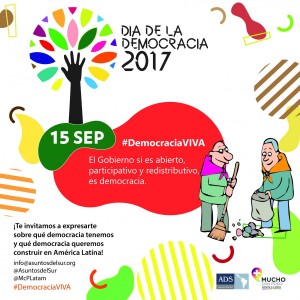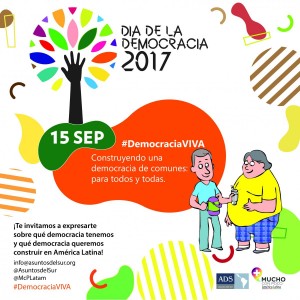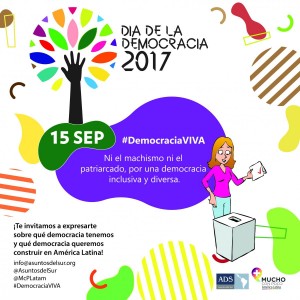The CSW is a body under the Economic and Social Council of the United Nations (UN), which began its functions in 1946 as the “main international intergovernmental body dedicated exclusively to the promotion of gender equality and empowerment of the woman”.
It meets annually, and in this event are the UN member states, civil society organizations and bodies of the UN Human Rights System. In this space, the actions of States to meet the commitments made at the 1995 Beijing World Conference on Women, its Declaration and Platform for Action, and the 23rd Special Session of the General Assembly in 2000 (Beijing +5). It also addresses relevant issues on the situation of women worldwide
From these sessions, the discussions and agreements that arise and the reports presented, the CSW generates conclusions and recommendations, which are then sent to the Economic and Social Council for follow-up.
The review theme for the 62nd session of the CSW, to be held in March 2018, focuses on “Participation and access of women to the media and information and communication technologies, as well as their impact and Use as an instrument for the advancement and empowerment of women”
Our Report
More than three years ago, along with Communicating Equality, we have monitored the organs of the State that must apply the protective norms of women in the media.
Our first research was crystallized in the publication “Gender Violence and Public Communication Policies“. Subsequently, policies related to gender and communication suffered regressive measures, which, far from improving what has already been achieved, have regressed in the role of guarantor of State rights.
In the report that we presented to the CSW, such measures were presented, as well as recommendations to achieve greater protection for women and the hearings of Argentina.
Among the regressive measures mentioned in the report are:
– Public Defender: Despite the efficient and participative management of the organization, this has been interrupted since November last year, when the Bicameral Commission, which should appoint the maximum authority of the Ombudsman’s Office, decided not to appoint anyone at the end of the term Of the first Public Defender, Lic. Cyntia Ottaviano. At present, the DPSCA is in an irregular situation and without capacity to carry out activities that go beyond mere formal and administrative communications. This limits the taking of comprehensive measures in cases of media violence based on gender or any other. This situation further aggravates Argentina’s failure to comply with the recommendations made by the CEDAW Committee in its Concluding Observations on the seventh periodic report of Argentina in 20167, especially paragraph 19, item “d”, in which Urges that “Law 26,522 of 10 October 2009 on Audiovisual Communication Services be amended in order to empower the Ombudsman to punish violations of provisions relating to gender stereotypes and sexism in the media Communication”.
– ENACOM: Since the dictates of the Decrees of Necessity and Urgency No. 13/2015, 236/2015 and 267/2015, a new body was created, ENACOM, which displaced the AFSCA, being the same subsumed in that body, Along with their faculties and functions. In flagrant violation of international commitments, and by taking regressive actions regarding the protection of the rights of the hearings, the law was ignored, and the protective scaffold created was dismantled.
These actions by the new government overlapped with the decrease in the budget of ENACOM, and a worrying uncertainty about how the new public regulatory policy for the media will become available. As of the end of 2015, there were no sanctions regarding violent content issued in the media, nor any formal response to requests for information made by civil society organizations in this regard.
– Observatory on Discrimination in Radio and Television: The Observatory as a tripartite body was dissolved in 2017, although apparently did not carry out its usual functions since January 2016, adding to the widespread disruption of public policies protecting gender and communication.
– National Women’s Council: Since 2016, the National Council of Women has taken a more active role in dealing with cases of symbolic and media violence and in early 2017 the Observatory for Symbolic and Media Violence – A bipartite body composed of the National Council of Women and the National Entity for Communications (ENACOM). So far in 2017, the Observatory intervened in 17 cases of media violence ex officio or at the request of whistleblowers. The intervention in most of them was carrying out a report of analysis of the situation discriminating and stigmatizing and sending the same to the mass media.
– Monitoring Office for Publication of Sexual Trade Offer Notices: Since its creation in 2011, until December 2015, OM has achieved that 85% of the media monitored (110 of the entire national territory, with national coverage, Regional and local) to comply with the current legislation, leaving notices of sexual offer with expressions degrading and discriminatory towards women by all media surveyed. He also conducted trainings and conferences throughout the country to raise awareness of media violence through specific media support and collaborated with the judiciary by providing data on individuals and networks that publish notices on trafficking in persons for Sexual exploitation.
Since December 2015, he has not published any reports on his actions.
Contact
Virginia Pedraza – vir.pedraza@fundeps.org




